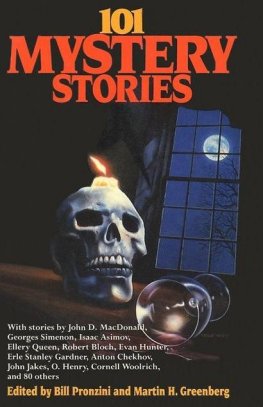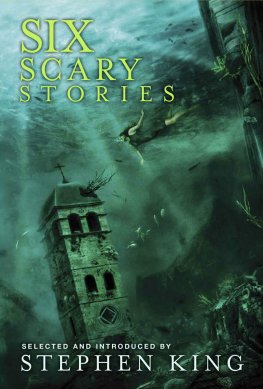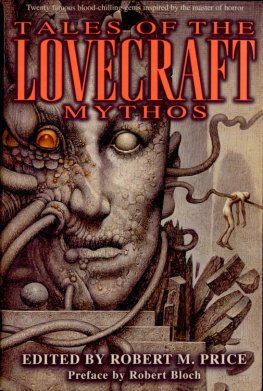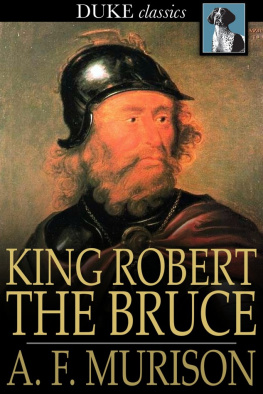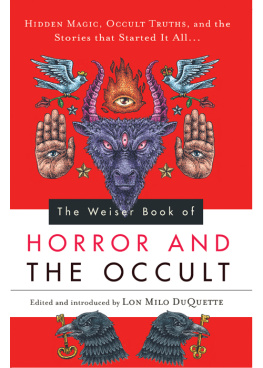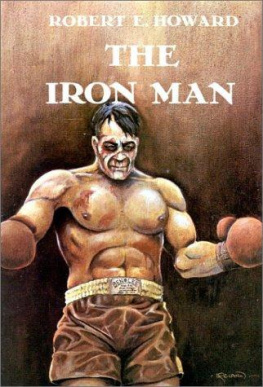Robert CHambers - The King in Yellow and Other Horror Stories
Here you can read online Robert CHambers - The King in Yellow and Other Horror Stories full text of the book (entire story) in english for free. Download pdf and epub, get meaning, cover and reviews about this ebook. City: Mineola, year: 1970, publisher: Dover Publications, genre: Science fiction. Description of the work, (preface) as well as reviews are available. Best literature library LitArk.com created for fans of good reading and offers a wide selection of genres:
Romance novel
Science fiction
Adventure
Detective
Science
History
Home and family
Prose
Art
Politics
Computer
Non-fiction
Religion
Business
Children
Humor
Choose a favorite category and find really read worthwhile books. Enjoy immersion in the world of imagination, feel the emotions of the characters or learn something new for yourself, make an fascinating discovery.
- Book:The King in Yellow and Other Horror Stories
- Author:
- Publisher:Dover Publications
- Genre:
- Year:1970
- City:Mineola
- ISBN:978-0-486-43750-7
- Rating:3 / 5
- Favourites:Add to favourites
- Your mark:
- 60
- 1
- 2
- 3
- 4
- 5
The King in Yellow and Other Horror Stories: summary, description and annotation
We offer to read an annotation, description, summary or preface (depends on what the author of the book "The King in Yellow and Other Horror Stories" wrote himself). If you haven't found the necessary information about the book — write in the comments, we will try to find it.
The King in Yellow and Other Horror Stories — read online for free the complete book (whole text) full work
Below is the text of the book, divided by pages. System saving the place of the last page read, allows you to conveniently read the book "The King in Yellow and Other Horror Stories" online for free, without having to search again every time where you left off. Put a bookmark, and you can go to the page where you finished reading at any time.
Font size:
Interval:
Bookmark:
Robert W. Chambers
THE KING IN YELLOW
Along the shore the cloud waves breaks,
The twin suns sink behind the lake,
The shadows lengthen
In Carcosa.
Strange is the night where black stars rise,
And strange moons circle through the skies,
But stranger still is
Lost Carcosa.
Songs that the Hyades shall sing,
Where flap the tatters of the King,
Must die unheard in
Dim Carcosa.
Song of my soul, my voice is dead,
Die thou, unsung, as tears unshed
Shall dry and die in
Lost Carcosa.
THE REPAIRER OF REPUTATIONS
Ne raillons pas les fous; leur folie dure plus longtemps que la ntre Voil toute la differnce.
TOWARD THE END of the year 1920 the Government of the United States had practically completed the programme, adopted during the last months of President Winthrops administration. The country was apparently tranquil. Everybody knows how the Tariff and Labor questions were settled. The war with Germany, incident on that countrys seizure of the Samoan Islands, had left no visible scars upon the republic, and the temporary occupation of Norfolk by the invading army had been forgotten in the joy over repeated naval victories and the subsequent ridiculous plight of General Von Gartenlaubes forces in the State of New Jersey. The Cuban and Hawaiian investments had paid one hundred per cent. and the territory of Samoa was well worth its cost as a coaling station. The country was in a superb state of defence. Every coast city had been supplied with land fortifications; the army under the parental eye of the General Staff, organized according to the Prussian system, had been increased to 300,000 men with a territorial reserve of a million; and six magnificent squadrons of cruisers and battle-ships patrolled the six stations of the navigable seas, leaving a steam reserve amply fitted to control home waters. The gentlemen from the West had at least been constrained to acknowledge that a college for the training of diplomats was as necessary as law schools are for the training of barristers. Consequently we were no longer represented abroad by incompetent patriots. The nation was prosperous. Chicago, for a moment paralyzed after a second great fire, had risen from it ruins, white and imperial, and more beautiful than the white city which had been built for its plaything in 1893. Everywhere good architecture was replacing bad and even in New York, a sudden craving for decency had swept away a great portion of the existing horrors. Streets had been widened, properly paved and lighted, trees had been planted, squares laid out, elevated structures demolished and underground roads built to replace them. The new government buildings and barracks were fine bits of architecture, and the long system of stone quays which completely surrounded the island had been turned into parks which proved a godsend to the population. The subsidizing of the state theatre and state opera brought its own reward. The United States National Academy of Design was much like European institutions of the same kind. Nobody envied the Secretary of Fine Arts, either his cabinet position or his portfolio. The Secretary of Forestry and Game Preservation had a much easier time, thanks to the new system of National Mounted Police. We had profited well by the latest treaties with France and England; the exclusion of foreign born Jews as a measure of nation self-preservation, the settlement of the new independent negro state of Suanee, the checking of immigration, the new laws concerning naturalization, and the gradual centralization of power in the executive all contributed to national calm and prosperity. When the Government solved the Indian problem and squadrons of Indian cavalry scouts in native costume were substituted for the pitiable organizations tacked on to the tail of skeletonized regiments by a former Secretary of War, the nation drew a long sigh of relief. When, after the colossal Congress of Religions, bigotry and intolerance were laid in their graves and kindness and charity began to draw warring sects together, many thought the millennium had arrived, at least in the new world, which after all is a world by itself.
But self-preservation is the first law, and the United States had to look on in helpless sorrow as Germany, Italy, Spain and Belgium writhed in the throes of Anarchy, while Russia, watching from the Caucasus, stooped and bound them one by one.
In the city of New York the summer of 1899 was signalized by the dismantling of the Elevated Railroads. The summer of 1900 will live in the memories of New York people for many a cycle; the Dodge Statue was removed in that year. In the following winter began that agitation for the repeal of the laws prohibiting suicide which bore its final fruit in the month of April, 1920, when the first Government Lethal Chamber was opened on Washington Square.
I had walked down that day from Dr. Archers house on Madison Avenue, where I had been as a mere formality. Ever since that fall from my horse, four years before, I had been troubled at times with pains in the back of my head and neck, but now for months they had been absent, and the doctor sent me away that day saying there was nothing more to be cured in me. It was hardly worth his fee to be told that; I knew it myself. Still I did not grudge him the money. What I minded was the mistake which he made at first. When they picked me up from the pavement where I lay unconscious, and somebody had mercifully sent a bullet through my horses head, I was carried to Doctor Archer, and he, pronouncing my brain affected, placed me in his private asylum where I was obliged to endure treatment for insanity. At last he decided that I was well, and I, knowing that my mind had always been as sound as his, if not sounder, paid my tuition as he jokingly called it, and left. I told him, smiling, that I would get even with him for his mistake, and he laughed heartily, and asked me to call once in a while. I did so, hoping for a chance to even up accounts, but he gave me none, and I told him I would wait.
The fall from my horse had fortunately left no evil results; on the contrary it had changed my whole character for the better. From a lazy young man about town, I had become active, energetic, temperate, and above alloh, above all elseambitious. There was only one thing which troubled me, I laughed at my own uneasiness, and yet it troubled me.
During my convalescence I had bought and read for the first time, The King in Yellow. I remember after finishing the first act that it occurred to me that I had better stop. I started up and flung the book into the fire-place; the volume struck the barred grate and fell open on the hearth in the fire-light. If I had not caught a glimpse of the opening words in the second act I should never have finished it, but as I stooped to pick it up, my eyes became riveted to the open page, and with a cry of terror, or perhaps it was of joy so poignant that I suffered in every nerve, I snatched the thing out of the coals and crept shaking to my bedroom, where I read it and reread it, and wept and laughed and trembled with a horror which at times assails me yet. This is the thing that troubles me, for I cannot forget Carcosa where black stars hand in the heavens; where the shadows of mens thoughts lengthen in the afternoon, where the twin suns sink into the Lake of Hali; and my mind will bear forever the memory of the Pallid Mask. I pray God will curse the writer, as the writer has cursed the world with this beautiful, stupendous creation, terrible in its simplicity, irresistible in its trutha world which now trembles before the King in Yellow. When the French Government seized the translated copies which had just arrived in Paris, London, of course, became eager to read it. It is well known how the book spread like infectious disease, from city to city, from continent to continent, barred here, confiscated there, denounced by press and pulpit, censured even by the most advanced of literary anarchists. No definite principles had been violated in those wicked pages, no doctrine promulgated, no convictions outraged. It could not be judged by any known standard, yet, although it was acknowledged that the supreme note of art had been struck in The King in Yellow, all felt that human nature could not bear the strain, nor thrive on words in which the essence of purest poison lurked. The very banality and innocence of the first act only allowed the blow to fall afterward with more awful effect.
Font size:
Interval:
Bookmark:
Similar books «The King in Yellow and Other Horror Stories»
Look at similar books to The King in Yellow and Other Horror Stories. We have selected literature similar in name and meaning in the hope of providing readers with more options to find new, interesting, not yet read works.
Discussion, reviews of the book The King in Yellow and Other Horror Stories and just readers' own opinions. Leave your comments, write what you think about the work, its meaning or the main characters. Specify what exactly you liked and what you didn't like, and why you think so.





